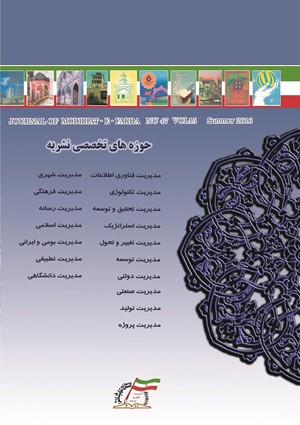The role of industry characteristics in human resource management practices and organizational strengthening of social capital in the country of Iran
Subject Areas :
1 - University of Science and Technology
2 - عضو هیات علمی
Keywords: Human resource management, organizational social capital, features of industrial,
Abstract :
Abstract Many scientists, human resources and production management, The next decade are called The human resources decade. In this study seeks to connect human resource management practices in order to strengthen social capital and the role of organizations adjust the industrial characteristics on them. Based on a study of 30 top companies in various industries in the country was conducted, the results showed that management practices that focus on facilitating contacts between staff, In relation to social capital and more efficient organization are much more positive. Also, it because the relationship stronger companies are active in industries with lower complexity. The results showed that the intensity of knowledge itself does not have a moderating effect And only seems to exist in order to join the industrial regulations and influence and its connection with human resource management practices and organizational social capital is necessary. The results of the statistical analysis shows that human resource management practices and positive effect on organizational social capital in industries with high intensity control domain is lower. The methodology of this study was descriptive survey and data collection forms library documentation and conducted field sampling questionnaire. In order to analyze the data, SPSS software was used.
[1]-Maurer, I., Bartsch, V., & Ebers, M. (2011). The value of intra-organizational social capital:How it fosters knowledge transfer, innovation performance, and growth. Organization Studies, 32(2), 157–185.
[2]- Gittell, J. H., Seidner, R., & Wimbush, J. (2010). A relational model of how highperformance work systems work. Organization Science, 21(2), 490–506.
[3]- Haas, M. R., & Hansen, M. T. (2005). When using knowledge can hurt performance: The value of organizational capabilities in a management consulting company. Strategic Management Journal, 26(1), 1–24.
[4]- Gerhart, B., Wright, P.M., McMahan, G. C., & Snell, S. A. (2000). Measurement error in research on human resources and firm performance: How much error is there and how does it influence effect size estimates? Personnel Psychology, 53(4), 803
[5]- Bolino, M. C., Turnley, W. H., & Blooddgood, J. M. (2002). Citizenship behavior and the creation of social capital in organizations. Academy of Management Review, 27(4), 505–522.
[6]- Carmona-Lavado, A., Cuevas-Rodríguez, G., & Cabello-Medina, C. (2010). Social and organizational capital: Building the context for innovation. Industrial Marketing Management, 39(4), 681–690.
[7]- Chuang, C. H., & Liao, H. (2010). Strategic human resource management in service context: Taking care of business by taking care of employees and customers. Personnel Psychology, 63(1), 153–196.
[8]- Coff, R. (2011). Bidding wars over R&D-intensive firms: Knowledge, opportunism, and the market for corporate control. Academy of Management Journal, 46(1), 74–85.
[9]- Collins, C. J., & Smith, K. G. (2011). Knowledge exchange and combination: The role of human resource practices in the performance of high-technology firms. Academy of Management Journal, 49(3), 544–560.
[10]- Dawson, J. F., & Richter, A. W. (2010). Probing three-way interactions in moderated multiple regression: Development and application of a slope difference test.
[11]- Ellinger, A. E., Elmadağ Baş, A. B., Ellinger, A. D., Wang, Y., & Bachrach, D. G. (2011). Measurement of organizational investments in social capital: The service employee perspective. Journal of Business Research, 64(6), 572–578.
[12]- Payne, G. T., Moore, C. B., Griffis, S. E., & Autry, C. W. (2011). Multilevel challenges and opportunities in social capital research. Journal of Management, 37(2), 491–520.
[13]- Pérez-Luño, A., Cabello Medina, C., & Carmona Lavado, A. (2011). How social capital and knowledge affect innovation. Journal of Business Research, 64(2), 1369–1376
14- میرسپاسی، ناصر. مدیریت منابع انسانی. 1389. تهران. انتشارات دانشگاه آزاد


